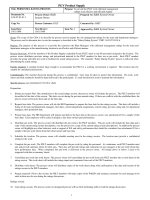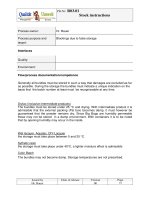Tài liệu Kaizen Preparation pdf
Bạn đang xem bản rút gọn của tài liệu. Xem và tải ngay bản đầy đủ của tài liệu tại đây (1.88 MB, 19 trang )
31/01/14 nhóm chuyên gia
HO CHI MINH UNIVERSITY OF TECHNOLOGY
HO CHI MINH UNIVERSITY OF TECHNOLOGY
FACULTY OF MACHINE
FACULTY OF MACHINE
INDUSTRIAL SYSTEM ENGINEERING
INDUSTRIAL SYSTEM ENGINEERING
KAIZEN
MASTER NGUYEN NHU PHONG
GROUP 13
LUU THANH DAT 20600456
DO MINH HOANG 20600778
What does Kaizen Mean?
Japanese term
“Kai” means “Change”
“Zen” means “for the better”
Kaizen: Continuous Improvement
Concept
Small incremental improvements
Improvements add up over time
What is a Kaizen Event?
Continuous Improvement
Event
Dedicated Resources
Specific Goals
Short time frame
Also known as Kaizen Blitz
(lightning fast improvement )
Why Use Kaizen?
To solve problems
To eliminate waste
Create ownership
Support lean thinking
1
2
3
4
5
6
7
Taiichi Ohno’s 7 Wastes
A short burst of intense activity & effort
(can range in hours to days)
Emphasis on action over analysis
Focused on improving the Value Stream
and achieving flow
Driven to resolving a specific problem or
achieving a specific goal.
What is a Kaizen Workshop?
What is a Kaizen Workshop?
A Kaizen Workshop is Characterized by
A focus on an area or process to achieve a
specific goal.
Includes a team that is empowered to make
changes.
Team make-up should include: Operators,
Maintenance, Outside Eyes, and a process owner.
Supported by management with Money, Time.
1. Define the opportunity
Cost, Quality, Waste
2. Form & train the team
They must be dedicated resources – commitment
They must be trained in specifics regarding the task at
hand.
3. Set goals / collect baseline data
Is the problem well understood – what does success
look like?
4. Leader & team responsibilities
Kaizen Preparation
How Are Kaizen Teams Formed?
Team composition & training is critical to
the success of the team
Composition should reflect the diversity of
the work center
A team generally consists of 6-10 people
Each member will be chosen to perform a
specific role – everybody works
Do It Again
Kaizen
Identify Waste
Plan
Counter-
measures
Reality
Check
Make
Changes
Celebrate
Measure
Results
Make this
the Standard
Document
Reality
Verify
Change
Start Here
Kaizen Cycle
Six Basic Rules of Kaizen
1. Respect others
2. Document reality
3. Do your share
4. Try something new
5. Ask why (the 5 why’s)
6. Be safe / Think safe
Tools for Kaizen Blitz Projects
1.Benchmarking
2.Pareto Charts
3.Cause and Effect diagrams
4.Brainstorming
5.Process Mapping
6.Spaghetti Diagrams
7.Internal vs. External time/steps
8.Root Cause Analysis (5 Whys)
16
Chicago Manufacturing Center
What is the goal of an Event?
Improve an area of the business
Process Waste Reduction
Space Reduction
Labor Efficiency
Quality or Mistake Proofing
Output Improvement
Manageable
Pick items that can be done right away
Employee Involvement
Culture change
Trying out ideas
What happens during an event?
Planning
Week 1
Select project & team leader
Communicate with target areas
Week 2
Select team members, define scope & goals
Write work plan/charter
Week 3
Confirm commitments & gather some data
Re-communicate with target areas
What happens during an event?
Week 4 – Event Week
Day 1
Training for event
Map & assess current state
Day 2
Determine improvements,
implement
Day 3
Pilot changes
Day 4
Review project
Present to management
What happens during an event?
Weeks 5, 6 & 7 – Follow up
Prioritize open action items
Report to management & core team
Open Items
Achievement of goals
Additional event if necessary
Close out project & document
Archive work plan
Scan all data collected
Everyone and Everything Wins
Front line staff
Better process
Ideas for change
“Being listened to and
allowed to shape the
process I work in”
Organisation
Key indicators
improved
Quality
Cost
Delivery
Safety
Morale
Customers
Increased
Satisfaction
Better quality
Better predictability
Lower costs
Questions & Answers









